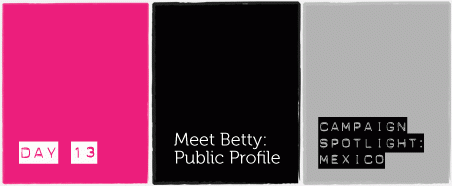
Meet Betty, a young woman from Morelos, Mexico. Her story speaks about the different connections and interactions that she encounters through online social networking – some of them expected and welcomed, some of them a little less straightforward. It’s also about how Betty exercises her judgment and discretion in dealing with them.
How do you exercise your judgment and right to privacy in online social networking spaces?
Access to and use of social networking services like Facebook is increasingly an important aspect of participating in public and political life. We have heard many recent examples of how social networking platforms have become valuable sites of social and political mobilizing and democratic participation. At a more personal level, they are becoming an important part of how we interact and connect with our communities. They can also be a space for us to construct representations of our “selves” through the things we share, including photographs, what we do, interests and personal information. For women and girls who are constrained in other spaces because of culture or norms, this can be especially important.
At the same time, there are certain safety risks when it comes to social networking sites. Because of the wealth of personal information available, it can be possible to make assessments about a particular person and target them for specific reasons. For example, based on what a person shares about her employment situation, or her relationship status, she can be targeted for financial scams involving fake employment and migration opportunities or “romantic relationships”. In countries such as Mexico where human trafficking is recognised as a serious issue, women’s rights activists are critically assessing the role of social networking sites in targeting potential victims.
How can we participate in shaping a social networking environment that enables us to fully participate in community and public life, without compromising our safety? How can our right to privacy be prioritised – from the development of technology, to corporate policy, to laws, to our own practices?
TAKE ACTION
Build your skills, share your ideas
- Take a dive into fine-tuning your privacy configuration in Facebook. Segment your friends into lists and learn how to specify which audience you want for each post.
- Play tech-tag: you show a friend how to improve her privacy settings, and ask her to share with another friend.
- Together, bring the conversation to your social networking forums: What do we love about them, and what turns us off or away?
- Share some stories and experiences about social networking spaces and privacy, and map them onto the Take Back the Tech! Map.
Build your knowledge
- Find out more about trafficking in your country. You can start with the International Migration Organisation.
- If you think it is not happening, you are wrong. And you can bet traffickers are taking advantage of social networking platforms to find women and girls who "fit their profile".
- Understanding and sharing how traffickers operate debilitates their chances of success.
------------
Take Back the Tech! in Mexico took the November 25 "Festival de las vivas" fair-goers to the test, putting up banners with "quizzes" to test internet safety practices and detect tech-related violence against women and girls. Facebook awareness campaigns via flyers and radio spots share tech-tips, like: "Have a sexy photo you just have to share? Then segment your Facebook friends into lists first".
Surveys on tech-related violence are being applied at youth workshops and cine debates throughout Morelos. Virtual activities include online daily actions to increase digital security for women journalists and human rights defenders, reaching 100's of women throughout Mexico and Central America. The campaign will close this year with a tech-fest on mobile security for women journalists and social communicators.
Take Back the Tech! partners in Mexico include youth sexuality and reproductive health activists, DDESER; anti-cyberbullying and child pornography initiative Social 2.0 for A Safer Internet; CIMAC women's news agency and network of journalists, and women human rights defenders throughout Mexico and Central America.
- Log in to post comments
